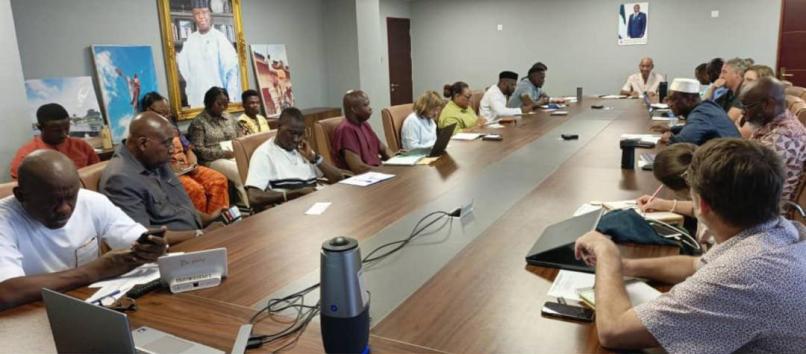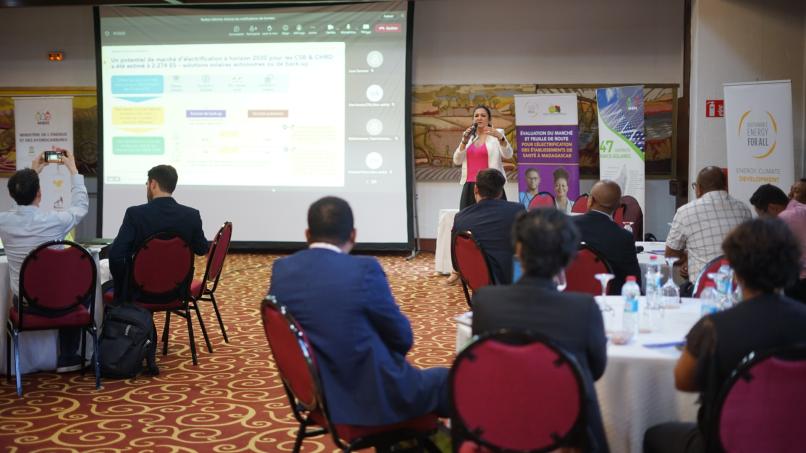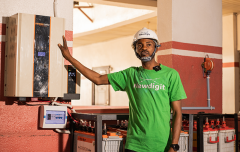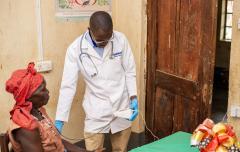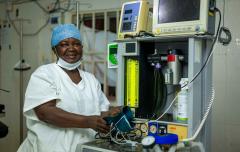Beyond the panels: Data, coordination and knowledge-sharing for healthcare electrification
Authored by Nashwa Naushad, Energy Access Officer, SEforALL
With contributions from Louis Tavernier and Ngozi Beckley-Lines, SEforALL, Noah Ochima, Uganda Energy Credit Capitalisation Company (UECCC) and Paul Safar, Health and Energy Platform of Action
Think of healthcare electrification like a grandfather clock.
The most visible parts - the swinging pendulum, the stately weights, the ornate clock face - are seemingly the most important ones. These are the solar photovoltaic (PV) systems, batteries and financing models — essential, high-impact and tangible.
But what keeps the clock running beyond these prominent pieces, are the many smaller gears which are out of sight. In the world of healthcare electrification, these less visible elements are data systems, coordination and knowledge-sharing. Without these ‘gears’ moving in sync with each other, the whole system is at risk of failing, no matter how shiny the pendulum - or the panels - are.
Gear #1: Data
High-quality data is critical for informed decision-making about energy system sizing, technology selection, business models and prioritization of facilities, yet such data often becomes guesswork.
Country-level market assessments carried out by Sustainable for All (SEforALL), International Renewable Energy Agency (IRENA) and other partners reveal that even the most basic information about the number, location and energy needs of health facilities to be electrified is generally unavailable, sparse or outdated. There is little data about the quality and reliability of electricity supply. Where data is available, it is collected by different authorities and organizations with no coordinate planning, leaving data scattered across multiple agencies.
Gear #2: Coordination
This brings us to the second gear – coordination. The task of powering health facilities straddles at least two sectors – health and energy. The health ministry understands healthcare needs and service delivery priorities while the energy ministry brings the technical expertise and infrastructure planning. Often, a third, fourth or even a fifth ministry is involved such as infrastructure, public works and/or rural development. In many countries, there is another dimension of decentralization with similar governance structures at the state or province level. Yet cross-sector coordination is mostly found lacking at all levels, especially regarding data, choice of locations for interventions, maintenance of installed infrastructure and investments.
Add to this mix development partners, donors, civil society and private sector players, and the risk of fragmentation increases. Without clear coordination, stakeholders may duplicate efforts – conducting parallel needs assessments, designing overlapping system models or testing similar technologies and business models in isolation.
This is true even at a global scale. Healthcare electrification sits at the nexus of climate action, health justice, and sustainable energy and development. No single actor can solve this challenge alone.
Gear #3: Knowledge-sharing
And that makes knowledge-sharing an extremely significant gear. To achieve universal healthcare electrification by the end of this decade – and ensure that these energy systems remain functioning for decades to come – we must learn from each other.
It is an important step to avoid reinventing the wheel. It means comparing notes on technologies, business models and service delivery innovations. It means making space for both public and private sector actors to contribute meaningfully – while respecting the need for competitive advantage, we can still share high-level lessons and scalable insights.
Keeping the clock chiming – leading by example
The sector is already beginning to embrace these three vital gears. Mechanisms are emerging nationally and globally, to integrate data, coordination and knowledge-sharing more intentionally. Here are some best practices:
Sierra Leone’s Mini-Grids Accelerators Committee
Under the leadership of Dr. Kandeh Yumkella, Chairman of the Presidential Initiative on Climate Change, Renewable Energy and Food Security in Sierra Leone, the Mini-Grids Accelerators Committee was established as a critical measure to collectively tackle key issues in the mini-grid sector. Dr. Yumkella and the Deputy Ministers of Energy convene this committee every week, bringing together ministries of health, energy, education and agriculture, development partners (SEforALL, UNICEF, UNOPS, FCDO, GIZ, the World Bank, etc.), mini-grid operators and financiers. It has fostered new modes of collaboration - from live feedback loops via WhatsApp to formal MoUs between the government and developers.
The group focuses on mini-grids powering health centres, schools, and agricultural communities – typically in the 200 kilowatt to 1 Megawatt range. The platform facilitates joint problem-solving on issues like tariff reform, rising operational costs, operations and maintenance models, and solar power project coordination across the health sector including the Sierra Leone Healthcare Electrification project.
“For one year now, we have had a working group for small-scale electrification that empowers health services, schools and also agricultural communities. We meet every week and we're sharing information. The other donors and international partners are also there. Just sharing information has an advantage. We are pooling resources. We are pooling knowledge systems.”
Dr. Kandeh Yumkella, Chairman, Presidenial Initiative for Climate Change, Renewable Energy and Food Security, Sierra Leone
Uganda Electricity Access Scaleup Project (EASP)
The Uganda Electricity Access Scaleup Project (EASP) follows a multi-stakeholder model for public institution electrification. Under this project, the Ministry of Health (MoH), the Ministry of Education and Sports (MoES), and the Ministry of Water and Environment (MoWE), are leading the electrification programme in coordination with the Ministry of Energy and Mineral Development (MEMD), Uganda Energy Credit Capitalisation Company (UECCC), and the Office of the Prime Minister (OPM) for institutions in refugee-hosting districts.
To promote sustainability, UECCC will offer grants of up to 70 per cent of capital costs to energy service companies (ESCOs). The collaboration extends beyond funding – it includes joint site selection, data sharing and planning, procurement guidance and exchange of technical expertise.
This partnership has led to the development of the Energy-as-a-Service (EaaS) model supported by the World Bank through Verasol and CLASP. Around 700 schools and health centres are set to benefit, with work commencing shortly in 45 schools under 10-year contracts. Notably, the Ministry of Health is incorporating lessons learned from the MoES to refine its own processes – a strong example of cross-sector learning.
“The Energy as a Service (EaaS) model is an innovative approach to the sustainable electrification of public institutions, developed through close collaboration among technical and policy experts from the ministries of Health, Education, Energy, and UECCC, with support from the World Bank. UECCC will also provide a grant to lower the cost of capital for ESCOs. The teams are continuously coordinating to create tender documents that best reflect the interests of the government and the ESCOs, ensuring the long-term provision of electricity in the selected schools and health centres.”
Noah Ochima, Program Manager, Public Institutions, Electricity Access Scale-up Project (EASP), Uganda Energy Credit Capitalisation Company (UECCC)
Health and Energy Platform of Action
The Health and Energy Platform of Action (HEPA), hosted by WHO, was established in 2019, and is convened by WHO, UNDP, UN Department of Economic and Social Affairs (DESA) and the World Bank, with strong support from IRENA. HEPA’s mission is to strengthen collaboration between the health and energy sectors to ensure universal access to clean and sustainable energy to protect the health of the most vulnerable populations.
HEPA was established to address two of the most pressing development challenges – household air pollution from polluting cooking practices and the lack of electricity in health-care facilities. With members from across different sectors – including governments, UN agencies, academia, financing institutions and non-governmental organizations – HEPA is a key global platform for fostering collaboration between the energy and health sectors. The platform mobilizes political and financial commitments, supports national roadmaps and implementation plans, and drives integrated strategies that align health, energy, gender and climate agendas.
“Ensuring universal access to clean and sustainable energy is not just an energy challenge—it is a health imperative. The Health and Energy Platform of Action plays a crucial role to foster collaboration between energy and health sectors, and to identify and implement solutions to protect the most vulnerable, strengthen health systems, and accelerate progress toward all Sustainable Development Goals. Only through bold, coordinated action across health, energy, climate, and development can we provide cleaner air, energy access, better environments and a healthier future for all.”
Heather Adair-Rohani, Unit Head, a.i., Air Quality, Energy and Health, WHO
Madagascar’s Health-Energy Working Group
In 2023, SEforALL established a working group in Madagascar to validate the data findings of the Powering Healthcare in Madagascar: Market Assessment and Roadmap for Health Facility Electrification report. The group included representatives from the Ministry of Health, Ministry of Energy and Hydrocarbons, Ministry of Decentralization, and development partners like UNICEF, the World Bank, the World Health Organization (WHO) and GIZ; private sector partners were also consulted.
Interministerial coordination improved greatly as a result, emphasizing the importance of sustaining the collaboration beyond the project completion. The group has since evolved into a long-term coordination platform for healthcare electrification. The World Bank, for instance, has convened the working group for consultations regarding the electrification of 1500 health facilities under their LEAD and DECIM projects. The working group now plays a key role in aligning national stakeholders and accelerating decision-making.
“As energy is a cross-cutting issue, good coordination between different sectors is essential. The multi-sector working group set up to draw up the roadmap [developed by SEforALL] is an excellent thing and will be continued. Thanks to all the partners and players working to improve the quality of care and electrification of healthcare facilities in Madagascar.”
Doctor RAMAROLAHY Rija, Director General, Healthcare Provision, Ministry of Public Health, Madagascar
Multilateral Compact for Health Facility Electrification
In 2021, during the UN High-level Dialogue on Energy, SEforALL and Power Africa convened several stakeholders to launch a Multilateral Energy Compact for Health Facility Electrification. This compact sets an ambitious target for organizations to contribute to, tracks progress in the sector and creates a platform for data-sharing.
The compact aims to drive stakeholders to reach a collective ambition of electrifying 35,000 health facilities by 2026 accompanied by 30 national and sub-national assessments related to powering healthcare. Close to 11,000 facilities have been electrified so far by compact signatories.
“To meet global healthcare needs, UNICEF has set a target to provide reliable electricity to 30,000 primary healthcare facilities by 2030. Raising such an investment will only be possible through strong coordination, advocacy, and partnerships. Therefore, UNICEF firmly supports the coordination platforms such as the Health Compact and the Health and Energy Platform for Action, which are crucial for information sharing and to have a joint action and fund mobilization plan.”
Michelle Seidel, Senior Immunization Advisor, UNICEF
The time to act is now
From Sierra Leone to Uganda to global initiatives like HEPA, we are seeing what becomes possible when the less visible gears work in harmony. The clock is now ticking for us to reach universal healthcare electrification by 2030. We must ensure stronger data systems, coordination and knowledge-sharing platforms to achieve this goal.

